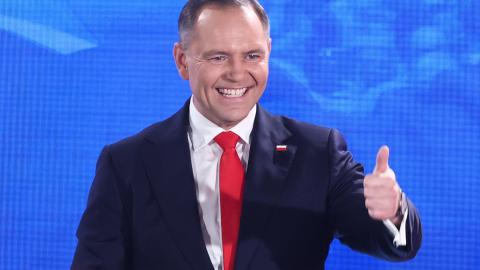On August 6, conservative Karol Nawrocki takes the oath of office as president of Poland. He has defeated formidable opponents – not only his rival, the center-left Warsaw mayor Rafal Trzaskowski, but also the major power brokers at home and abroad who backed him. After winning the vote count on June 2, Mr. Nawrocki experienced formal challenges by Prime Minister Donald Tusk and his former Justice Minister Adam Bodnar that lasted for a month, followed by another four weeks of public questioning of the outcome.
The government alleged electoral irregularities and questioned the legitimacy of the Supreme Court judicial chamber that certified his victory. All of this came even after European Union Commission President Ursula von der Leyen, German Chancellor Friedrich Merz, Ukrainian President Volodymyr Zelenskiy, United States President Donald Trump and others quickly congratulated Mr. Nawrocki as the winner.
The Polish Supreme Court thoroughly examined and dismissed these objections, pointing out on July 1 that the government had not challenged the legitimacy of the same chamber’s confirmation of the 2023 parliamentary elections that certified the Tusk government and elected Mr. Bodnar to the Senate, nor the 2024 Warsaw and European Parliament elections. It further argued that the approximately 20 cases of discrepancies uncovered during recounts would not have changed the outcome of the election.
The final result thus remained virtually the same as announced on June 2, with 42 year-old Mr. Nawrocki, an independent backed by the conservative Law and Justice (PiS) Party, obtaining some 50.9 percent of the vote, and 53 year-old Mr. Trzaskowski, backed by the center-left coalition led by Civic Platform (PO) – Poland’s main ruling party – at 49.1 percent, losing by a margin of 1.7 percent, or less than 370,000 votes, the smallest in post-1989 history. Recounts showed that some 18,000 votes shifted to Mr. Trzaskowski, far too few to have affected the outcome.
By July 1, Prime Minister Tusk’s coalition partners had recognized Mr. Nawrocki as the winner. Nonetheless, Mr. Tusk continued to question the outcome throughout July, and Parliament Speaker Szymon Holownia caused an uproar on July 25 by telling Polsat TV that persons associated with the coalition had suggested the president-elect should not be inaugurated. The revelation indicated continuing government efforts to sow doubt about the outcome. Others close to the government have spoken of taking the matter to the European Court of Human Rights.
Mr. Nawrocki’s victory dealt a huge blow to the Tusk government, which very much needed the presidency to deliver on many as-yet largely unfulfilled 2023 campaign promises, boost its sagging ratings and set itself up to win the next parliamentary election, scheduled for fall 2027.
Who is Karol Nawrocki and how did he win?
Like current President Andrzej Duda, Mr. Nawrocki was not a professional politician when PiS nominated him as its candidate. Formally, he is an independent. A one-time amateur boxer with a PhD in history who entered politics from his position as Director of the Institute of National Remembrance, a Warsaw-based, state-funded research institute focusing on crimes against the Polish nation, he was not well known nationally and not practiced in the rough and tumble of Polish politics.
His opponent was the polished, nationally known, long-serving mayor of Warsaw, Rafal Trzaskowski, who had come very close to winning the presidency in 2020. Mr. Trzaskowski also enjoyed the support of the urban establishment that largely sets the political agenda in Poland, the mainstream media that dominate the airwaves and social media, the European Commission that provides billions of euros in subsidies to the state budget annually, and the German government that has had a strong relationship with Mr. Tusk and his PO party for years.
Mr. Nawrocki also overcame major funding gaps after the government refused to provide him with the state support required by law for candidates’ campaigns. He faced late-breaking allegations that raised questions about his character, the source of which may have been the domestic intelligence agency ABW. Although each of these major power centers made their preference for Mr. Trzaskowski clear, Mr. Nawrocki still won, handing the Warsaw mayor his second defeat in a presidential election and fueling speculation that his political aspirations for the palace have ended.
The election was also a referendum on the Tusk government.
A number of factors contributed to Mr. Nawrocki’s victory. He came across to the average voter as a smart, authentic candidate, closer to their concerns than Mr. Trzaskowski, who was perceived as the anointed candidate of the liberal, urban Polish elite backed by Brussels and Berlin. While Polish voters have become more progressive over time – for instance, more tolerant of abortion, gay rights and EU influence in domestic affairs – traditional values of family, church, region and nation (summarized by one of Poland’s most famous mottos “Bog, Honor, Ojczyzna” or “God, Honor, Country”) remain rooted in large swaths of the country.
As a historian who long focused on Poland’s tragic past, Mr. Nawrocki’s bona fides as a patriot and protector of Polishness and the national interest were clear. In contrast, large constituencies associated Mr. Trzaskowski with the Tusk government’s subordination of Polish interests to foreign interests, including moving away from bedrock Polish values. The Nawrocki campaign also benefitted from a perception among voters that coalition politicians looked down on them – not unlike Hillary Clinton’s 2016 reference to some U.S. voters as “a basket of deplorables.” Coalition politicians reinforced this sense of cultural condescension by reminding the public that Mr. Trzaskowski speaks five languages and making fun of Mr. Nawrocki’s English, which he speaks well.
Mr. Nawrocki and his campaign also assessed the mood and priorities of the Polish electorate more accurately than did the Trzaskowski campaign. The latter seems to have concluded from its 2023 victory that voter demographics and preferences had changed permanently and that with strong support from the major power centers its victory was all but assured. This led to a certain complacency in the campaign and unforced errors.
Meanwhile, Mr. Nawrocki campaigned much more vigorously and was particularly effective in connecting with rightist constituencies, especially younger, male demographics in the critical second round, gaining most voters of the right-wing Konfederacja party, which won almost 15 percent in round one. Mr. Trzaskowski was unable to grow his center-left coalition as much, even as he framed his candidacy as another epic battle between “democrats” and “autocrats” and portrayed himself as the last bastion against “illiberalism.”
The election was also a referendum on the Tusk government. Mr. Nawrocki gained from the prime minister’s loss of popularity, with few results to show after 18 months in office and voter fears of Mr. Tusk taking control of all institutions of state. Mr. Nawrocki benefitted as well from his opponent’s mistakes, such as tone-deaf behavior at debates and other public events, which reinforced his image as disconnected from voters.
Relying on opinion polls that chronically undercount conservative sentiment, Mr. Trzaskowski’s campaign believed the results published by mainstream opinion survey firms that showed PiS was behind. It became overconfident that it could defeat the unknown, untried and untested Mr. Nawrocki. These factors also played a role in subsequent government efforts to challenge the results.















